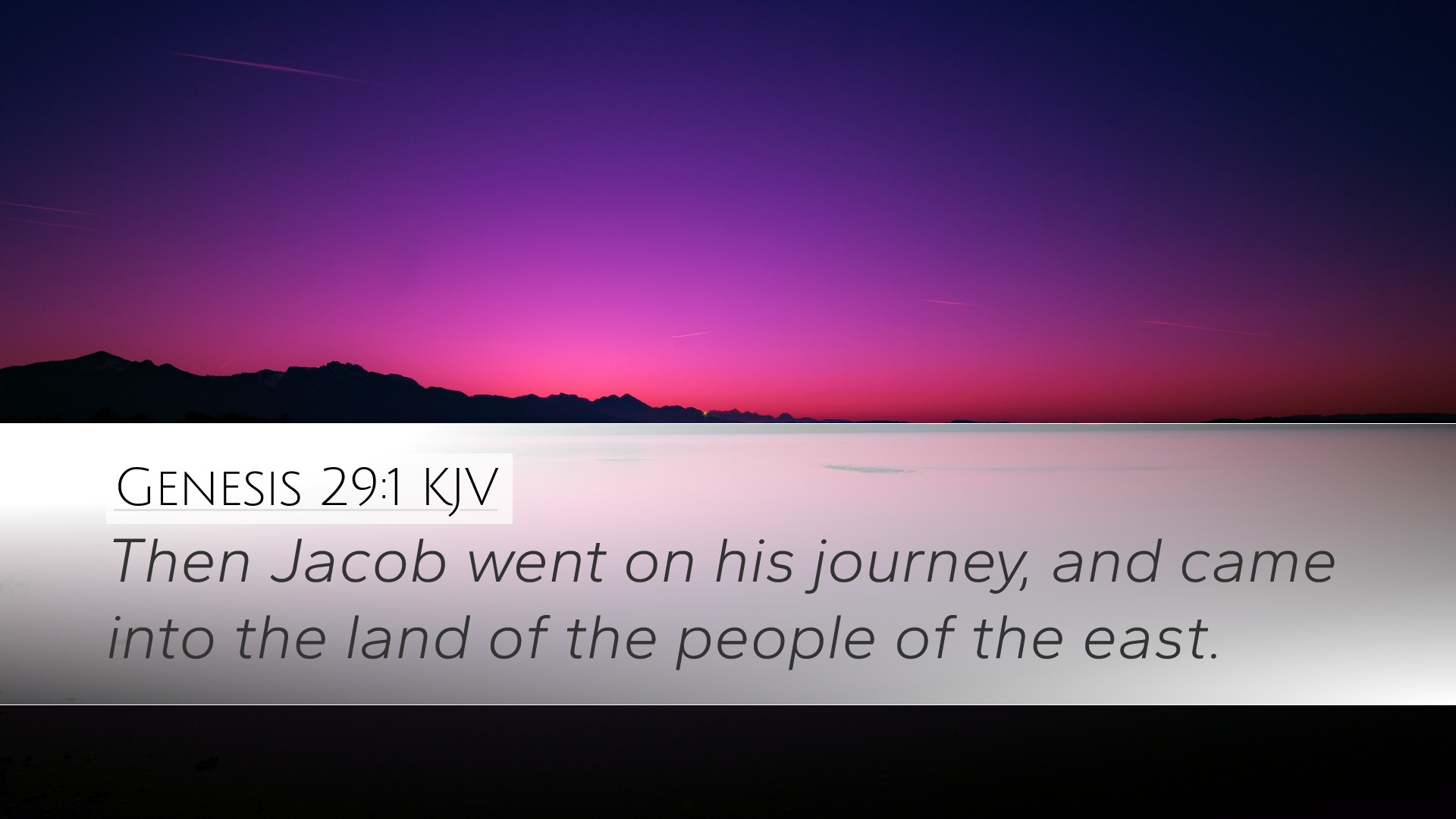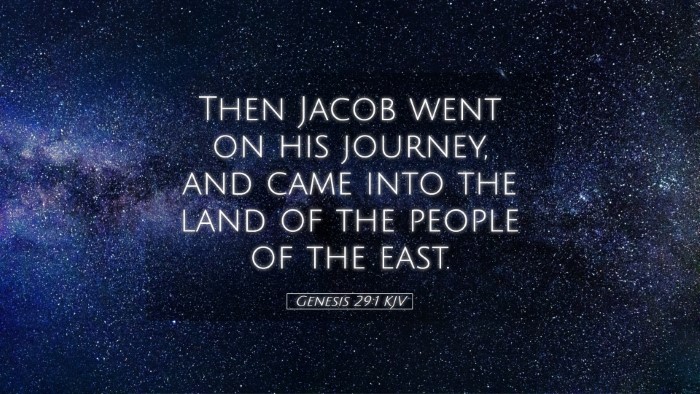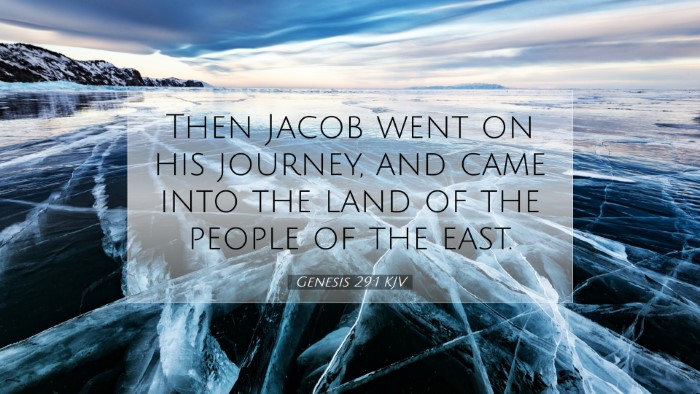Commentary on Genesis 29:1
Bible Verse: "Then Jacob went on his journey and came to the land of the people of the east."
Introduction
Genesis 29:1 presents a pivotal moment in Jacob's journey. As he departs from his home, filled with anxiety and hope, this verse encapsulates the beginning of an important chapter in his life. In this commentary, we will explore insights from notable public domain commentators, including Matthew Henry, Albert Barnes, and Adam Clarke, to uncover the deeper meanings and implications of this passage.
Contextual Background
To understand the significance of this verse, it is essential to consider Jacob's earlier experiences. Having obtained the birthright and blessing through cunning methods, Jacob is fleeing from his brother Esau’s wrath. His journey to the land of the east marks not just a physical relocation but also a spiritual and emotional transition.
Insights from Matthew Henry
Matthew Henry emphasizes Jacob's journey as both a literal and metaphorical path towards fulfillment of God's promises. He notes that Jacob’s travel is characterized by a sense of purpose and divine destiny. Henry asserts that Jacob's journey symbolizes the believer's path towards spiritual maturity, suggesting that life is often a pilgrimage filled with trials meant to refine character and strengthen faith.
- Divine Guidance: Jacob's movement is seen as directed by God's providence. This resonates with the theme that God orchestrates the lives of His people, leading them to their appointed destinations.
- The Importance of Location: The mention of the "land of the people of the east" points towards a specific cultural and spiritual context. Henry implies that this journey would lead Jacob to significant encounters that would shape his destiny.
Insights from Albert Barnes
Albert Barnes provides an interpretive perspective on Jacob's actions, focusing on the implications of his journey. He elaborates on the geographical aspect of the 'land of the people of the east,' suggesting it represents a place of both opportunity and challenge.
- Historical Context: Barnes highlights that the east was known for its nomadic lifestyles and distinct cultural identities. Jacob's entrance into this land can be seen as a move into the unknown, which reflects the believer's own journey of faith and exploration.
- Spiritual Significance: Barnes notes the prophetic significance of Jacob’s journey. This migration not only fulfills familial duties but also places Jacob in the pathway of God's unfolding plan through his eventual marriage to Rachel, which will play a critical role in the lineage of Israel.
Insights from Adam Clarke
Adam Clarke's commentary brings attention to the emotional aspects of Jacob’s journey. He notes that Jacob was leaving behind his family and familiar comforts, which signifies sacrifice and obedience to God's call.
- Emotional Transition: Clarke emphasizes Jacob's state of mind; filled with anxiety about Esau’s vengeance yet hopeful for the future God has promised him. This reflects the duality often experienced by believers during a period of transition.
- Journey as Preparation: Clarke posits that this journey was preparatory for Jacob, not only leading him to find a wife but also to experience significant spiritual encounters that would prepare him for his role as the father of the twelve tribes of Israel.
Theological Implications
The analysis of Genesis 29:1 highlights several key theological concepts relevant to pastors, students, and scholars:
- God's Sovereignty: The journey of Jacob illustrates God's overarching providence, guiding believers through uncertain times and leading them to where they are meant to be.
- The Nature of Faith: Jacob's journey serves as a metaphor for the believer's walk of faith; it is filled with both uncertainty and a promise of divine guidance.
- Covenantal Relationships: This moment foreshadows God's covenantal promises to Jacob, emphasizing that God's plans often unfold through our obedience to His call.
Practical Reflections
Reflecting on Genesis 29:1, there are several practical applications for contemporary readers:
- Trust in God's Direction: Just as Jacob trusted God during his journey, believers are reminded to seek divine guidance in their own life transitions.
- Understanding Sacrifice: Jacob's departure from his family serves as a reminder that following God's plan may require significant personal sacrifice.
- Hope in Uncertainty: The verse encourages believers to maintain hope during uncertain seasons of life, trusting that God is working behind the scenes.
Conclusion
Genesis 29:1 serves as a profound reminder of the journey of faith. The insights from Matthew Henry, Albert Barnes, and Adam Clarke collectively enrich our understanding of this pivotal moment in Jacob's life. As we explore the details of his journey, we are encouraged to reflect on our own journeys and the assurances of God’s guidance and providence in our lives.


